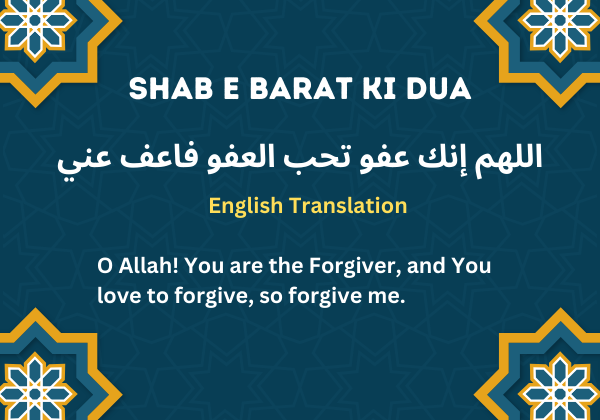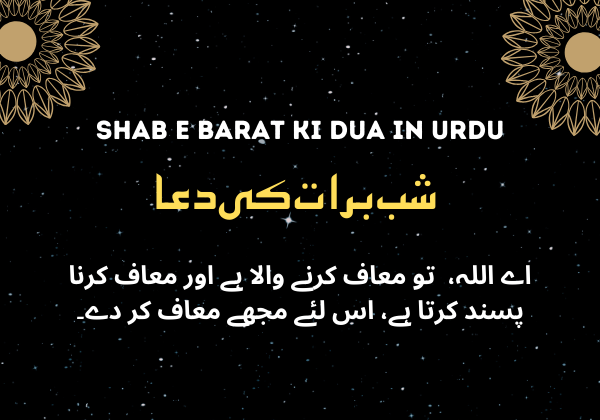Shab e Barat is a significant and blessed night in the Islamic calendar. The term ‘Bara’at’ translates to ‘Innocence’ or ‘Freedom from Guilt’. Muslims across the world celebrate it full of Religious enthusiasm. They believe that Allah writes the destinies of all Muslims for the coming year on this night.
Shab-e-Barat, often called the “Night of Forgiveness,” falls on the 15th night of the Islamic month of Shaban. Many believe that on this night, God descends to the nearest heaven and forgives the vast majority of His creation. It’s like a celestial midnight sale, where the item on offer is divine forgiveness!
Shab e Barat ki Dua
Muslims recite different duas, seeking God’s mercy, forgiveness, and blessings for themselves and their loved ones. While there are many prayers and duas for this night, here is one of the commonly recited Shab e Brat Dua:
In Arabic:
اللهم إنك عفو تحب العفو فاعف عني
English Translation:
O Allah! You are the Forgiver, and You love to forgive, so forgive me.
Transliteration:
Allahumma innaka ‘afuwwun tuhibbul ‘afwa fa’fu ‘anni.
This dua highlights God’s attribute as the “Al-Afuw” (The Pardoner) and seeks His pardon and mercy.

Shab e Barat Ki Dua in Urdu
Often, people want to know the meaning of Dua e Shab in their native language. Urdu-speaking community recite dua in Urdu Language to understand the soul of Dua.
“اللہم! تو معاف کرنے والا ہے اور معاف کرنا پسند کرتا ہے، اس لئے مجھے معاف کر دے۔”
In addition to this, many Urdu-speaking Muslims also recite various other supplications and verses from the Quran, seeking God’s blessings and mercy.

The Importance Of Shab E Barat
The Power of Intent 💫
On Shab-e-Barat, it’s not just about reciting prayers robotically. The power lies in the intent, in understanding and feeling each word. When you say the dua, imagine your past mistakes, big or small, and genuinely seek forgiveness.
Is it Just About Forgiveness? 🌺
Not entirely! While forgiveness is a big theme, Shab-e-Barat is also a night of reflection, gratitude, and making intentions for the coming year. Think of it as a spiritual checkpoint: where have you been, and where are you headed?
Beyond the Dua – Acts of Worship 🕌
Many spend this night in additional acts of worship, like reading the Qur’an or performing extra prayers. The idea is to get closer to God, to reconnect, and rejuvenate one’s faith.
The Cultural Canvas 🎨
Different cultures have adorned Shab-e-Barat with unique customs. In some parts, people light up their homes, distribute sweets, or visit the graves of loved ones. It’s fascinating how one religious event takes on diverse hues across the world!
“I’m Not Perfect; Will My Dua Be Accepted?” 🙏
Hey, guess what? None of us are perfect. Shab-e-Barat isn’t just for the saints; it’s for every flawed, trying their best human out there. The key is sincerity. Approach the night with a genuine heart, and trust in God’s boundless mercy.
A Night of Hope 🌟
Shab-e-Barat comes every year as a reminder that no matter how dark things seem, there’s always a chance for a new dawn, a fresh start. The dua is a beacon, a light guiding us back to the path of righteousness and hope.
Share the Love ❤️
While seeking forgiveness for oneself, it’s also a beautiful act to pray for others. In the spirit of community and unity, make dua for your family, friends, and even those you may not know. After all, collective blessings uplift everyone!
Wrapping It Up 🌌
Shab-e-Barat’s dua is more than just words; it’s an emotion, a sentiment, a bridge reconnecting us to our Creator. It’s an open invitation from the divine, asking us to return, to seek, and to find.
No matter your background or where you stand in your spiritual journey, remember that nights like Shab-e-Barat are moments of grace in the vast timeline of our lives. Embrace it, cherish it, and let the dua resonate in your heart.
How to make Dua on Shab e Barat
While there isn’t a specific method prescribed universally, the following steps are based on standard practices and teachings of scholars:
- Begin with Praise: Start your supplication by praising Allah and sending blessings upon the Prophet Muhammad (PBUH). It is a common practice before making any dua.
- Repentance: Before asking for anything, seek forgiveness for your sins. This night is known for Allah’s mercy and forgiveness, so it’s a good time to repent sincerely.
- Pray with Humility: Approach your supplications with a humble heart.
- Be Specific: While you can ask for anything good for you, being specific in your requests can make your supplications more heartfelt and focused.
- Pray for Others: The Prophet Muhammad (PBUH) said that when a Muslim makes a dua for another person, the angels say, “Ameen, and for you the same.” So, remember your family, friends, and even those you don’t know in your prayers.
What should we pray on Shab e Barat?
- Shab e Barat is a special occasion in the Islamic calendar. There are standard practices and recommendations associated with this night. Here’s a guide on how one can celebrate Shab e Barat:
- Night of Prayer: Many Muslims choose to spend a significant portion of the night in prayer, performing extra voluntary prayers (nafl) and seeking God’s mercy and blessings.
- Recitation of the Quran: It’s a good practice to recite the Quran on this night. Some choose to recite specific Surahs like Surah Yasin due to their virtues, while others may engage in a more extended recitation.
- Seeking Forgiveness: Shab e Barat is known as the night when God decrees the fate of individuals for the upcoming year. It’s a reasonable time to seek forgiveness for past sins and mistakes. A sincere repentance, coupled with the intention not to repeat those mistakes, is highly recommended.
- Making Dua: Apart from the regular supplications, believers are encouraged to make personal duas, asking for guidance, health, prosperity, and blessings for themselves and their loved ones.
- Fasting: While not obligatory, some Muslims choose to fast on the day following Shab e Barat as an act of worship and to seek additional blessings.
- Remembering the Deceased: It’s a common practice to pray for deceased family members and friends on this night, asking God to grant them peace and elevate their status in the hereafter.
- Giving Charity: Engaging in acts of charity (sadaqah) is another way to seek blessings on this night. Many choose to give to the needy, support charitable projects, or help those in their community.
- Reflect and Set Intentions: Use this night as an opportunity for introspection. Reflect on the past year, set positive intentions for the coming year, and make a commitment to improve oneself in various aspects of life.
- Sharing the Significance: Share the importance of Shab e Barat with family and friends, especially the younger generation, ensuring that the essence of this night is understood and appr
Shab e Barat Ki Tasbeeh
Shab-e-Barat, or the “Night of Forgiveness,” is a significant night in the Islamic calendar. On this night, many Muslims around the world engage in prayers, recitation of the Qur’an, and other acts of worship. While there’s no specific “tasbeeh” (a form of repetitive prayer or dhikr) that’s universally associated with Shab-e-Barat, many believers have personal practices and traditions they uphold.
However, a common practice on this night, as on many other significant nights in Islam, is the recitation of:
- SubhanAllah (سبحان الله) which means “Glory be to Allah”
- Alhamdulillah (الحمد لله), meaning “All praise is due to Allah.”
- Allahu Akbar (الله أكبر), which translates to “Allah is the Greatest.”
(Note: The practices and beliefs associated with Shab-e-Barat can vary among different Islamic traditions and communities. It’s always great to consult local scholars or trusted sources for specific guidance.
Shab e barat namaz ka tarika
Here’s a general method that some Muslims might follow for special prayers on Shab-e-Barat, though it’s worth noting that practices can vary among different Islamic traditions:
- Intention (Niyyah): Before starting any prayer, one must have a clear intention. For Shab-e-Barat, the intent could be to seek closeness to Allah and to ask for forgiveness.
- Tahajjud Prayer: Many people pray the Tahajjud prayer during the last third of the night. This prayer can be as short as two units (rak’ahs) or much longer, depending on the individual’s capacity and devotion.
- Reading Surah Yasin: Some believe that reciting Surah Yasin three times on this night, especially after Maghrib prayer, brings blessings and mercy.
- Special Supplications: People often make prolonged personal supplications (duas) on this night, asking for forgiveness, guidance, and blessings for themselves and their loved ones.
- Additional Acts of Worship: Beyond the specific prayers, some people might engage in other acts of worship, such as:
- Reading from the Qur’an
- Making dhikr (remembrance of Allah) using phrases like “SubhanAllah,” “Alhamdulillah,” and “Allahu Akbar.”
- Giving charity
- Seeking forgiveness for deceased family members and visiting their graves.
- Optional Prayers: Some traditions recommend praying 6, 12, or even 100 rak’ahs in sets of two, reciting specific Surahs after the Fatiha in each rak’ah.
Shohar Ki Mohabbat Ke Liye Dua
Dua e Tawassul: An In-Depth Guide to Supplication and Its Significance in Islam
